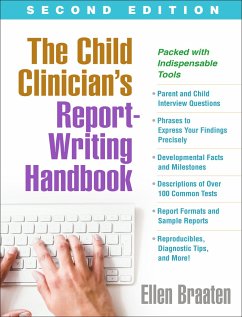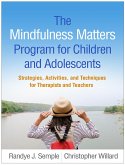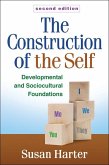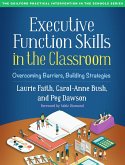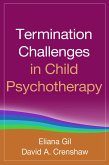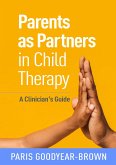Ellen Braaten
The Child Clinician's Report-Writing Handbook
Ellen Braaten
The Child Clinician's Report-Writing Handbook
- Gebundenes Buch
Andere Kunden interessierten sich auch für
![The Mindfulness Matters Program for Children and Adolescents The Mindfulness Matters Program for Children and Adolescents]() Randye J SempleThe Mindfulness Matters Program for Children and Adolescents68,99 €
Randye J SempleThe Mindfulness Matters Program for Children and Adolescents68,99 €![The Construction of the Self The Construction of the Self]() Susan HarterThe Construction of the Self80,99 €
Susan HarterThe Construction of the Self80,99 €![School Psychology for the 21st Century School Psychology for the 21st Century]() Kenneth W MerrellSchool Psychology for the 21st Century72,99 €
Kenneth W MerrellSchool Psychology for the 21st Century72,99 €![Executive Function Skills in the Classroom Executive Function Skills in the Classroom]() Laurie FaithExecutive Function Skills in the Classroom63,99 €
Laurie FaithExecutive Function Skills in the Classroom63,99 €![Principles of Forensic Report Writing Principles of Forensic Report Writing]() Michael KarsonPrinciples of Forensic Report Writing69,99 €
Michael KarsonPrinciples of Forensic Report Writing69,99 €![Termination Challenges in Child Psychotherapy Termination Challenges in Child Psychotherapy]() Eliana GilTermination Challenges in Child Psychotherapy40,99 €
Eliana GilTermination Challenges in Child Psychotherapy40,99 €![Parents as Partners in Child Therapy Parents as Partners in Child Therapy]() Paris Goodyear-BrownParents as Partners in Child Therapy68,99 €
Paris Goodyear-BrownParents as Partners in Child Therapy68,99 €-
-
-
Produktdetails
- Verlag: Guilford Publications
- 2nd edition
- Seitenzahl: 384
- Erscheinungstermin: 2. September 2019
- Englisch
- Abmessung: 279mm x 208mm x 28mm
- Gewicht: 1157g
- ISBN-13: 9781462540709
- ISBN-10: 1462540708
- Artikelnr.: 55313111
Hinweis: Dieser Artikel kann nur an eine deutsche Lieferadresse ausgeliefert werden.
- Herstellerkennzeichnung
- Libri GmbH
- Europaallee 1
- 36244 Bad Hersfeld
- gpsr@libri.de
Ellen Braaten, PhD, is Executive Director of the Learning and Emotional Assessment Program at Massachusetts General Hospital (MGH), Associate Professor of Psychology at Harvard Medical School (HMS), and Visiting Professor at Charles University in Prague, Czech Republic. She has been affiliated with MGH and HMS since 1998. Dr. Braaten is widely recognized for her expertise in pediatric neuropsychological and psychological assessment, particularly in the areas of assessing learning disabilities and attentional disorders. Her research and numerous publications focus on attention-deficit/hyperactivity disorder, learning disabilities, gender and psychopathology, intelligence, and assessment. She has published numerous books for professionals and parents, including Bright Kids Who Couldn't Care Less and Bright Kids Who Can't Keep Up.
Introduction
I. Questions for Conducting a Psychological Evaluation of a Child or
Adolescent
1. Beginning the Interview
2. Questions for Parents on Signs, Symptoms, and Behavior Patterns
3. Observation Procedures and Questions for Children and Adolescents
4. Questions for Teachers or Other Professionals
5. The Formal Mental Status Exam with Children and Adolescents
6. Ending the Interview
II. Standard Terms and Statements for Wording Psychological Reports
7. Beginning the Report
8. Reasons for Referral
9. History of Current Symptoms
10. Medical and Psychiatric Background Information
11. Developmental and Family History
12. Academic and School History
13. Behavioral Observations
14. Attitude toward Testing
15. Affective Symptoms and Mood/Anxiety Disorders
16. Childhood Behavioral and Cognitive Disorders
17. Home and Family
18. School
19. Social and Work Relationships, Recreational Activities
20. General Guidelines for Presenting Test Results in a Report
21. Tests of Intellectual Functioning
22. Achievement Measures
23. Tests of Language Functioning
24. Memory Tests
25. Tests of Visual-Spatial and Motor Skills
26. Measures of Executive and Neuropsychological Functioning
27. Measures of Emotional and Personality Functioning
28. Behavior Rating Scales and Tests of Adaptive Functioning
29. Diagnostic Statements/Impressions
30. Summary of Findings and Conclusions
31. Recommendations
32. Closing Statements
III. Special Circumstances and Useful Resources
33. Writing for the Schools
34. Treatment Planning
35. Report Formats and Sample Reports
36. Resources for Professionals
37. Resources for Parents
38. Medications
39. Abbreviations in Common Use
40. Useful Forms
I. Questions for Conducting a Psychological Evaluation of a Child or
Adolescent
1. Beginning the Interview
2. Questions for Parents on Signs, Symptoms, and Behavior Patterns
3. Observation Procedures and Questions for Children and Adolescents
4. Questions for Teachers or Other Professionals
5. The Formal Mental Status Exam with Children and Adolescents
6. Ending the Interview
II. Standard Terms and Statements for Wording Psychological Reports
7. Beginning the Report
8. Reasons for Referral
9. History of Current Symptoms
10. Medical and Psychiatric Background Information
11. Developmental and Family History
12. Academic and School History
13. Behavioral Observations
14. Attitude toward Testing
15. Affective Symptoms and Mood/Anxiety Disorders
16. Childhood Behavioral and Cognitive Disorders
17. Home and Family
18. School
19. Social and Work Relationships, Recreational Activities
20. General Guidelines for Presenting Test Results in a Report
21. Tests of Intellectual Functioning
22. Achievement Measures
23. Tests of Language Functioning
24. Memory Tests
25. Tests of Visual-Spatial and Motor Skills
26. Measures of Executive and Neuropsychological Functioning
27. Measures of Emotional and Personality Functioning
28. Behavior Rating Scales and Tests of Adaptive Functioning
29. Diagnostic Statements/Impressions
30. Summary of Findings and Conclusions
31. Recommendations
32. Closing Statements
III. Special Circumstances and Useful Resources
33. Writing for the Schools
34. Treatment Planning
35. Report Formats and Sample Reports
36. Resources for Professionals
37. Resources for Parents
38. Medications
39. Abbreviations in Common Use
40. Useful Forms
Introduction
I. Questions for Conducting a Psychological Evaluation of a Child or
Adolescent
1. Beginning the Interview
2. Questions for Parents on Signs, Symptoms, and Behavior Patterns
3. Observation Procedures and Questions for Children and Adolescents
4. Questions for Teachers or Other Professionals
5. The Formal Mental Status Exam with Children and Adolescents
6. Ending the Interview
II. Standard Terms and Statements for Wording Psychological Reports
7. Beginning the Report
8. Reasons for Referral
9. History of Current Symptoms
10. Medical and Psychiatric Background Information
11. Developmental and Family History
12. Academic and School History
13. Behavioral Observations
14. Attitude toward Testing
15. Affective Symptoms and Mood/Anxiety Disorders
16. Childhood Behavioral and Cognitive Disorders
17. Home and Family
18. School
19. Social and Work Relationships, Recreational Activities
20. General Guidelines for Presenting Test Results in a Report
21. Tests of Intellectual Functioning
22. Achievement Measures
23. Tests of Language Functioning
24. Memory Tests
25. Tests of Visual-Spatial and Motor Skills
26. Measures of Executive and Neuropsychological Functioning
27. Measures of Emotional and Personality Functioning
28. Behavior Rating Scales and Tests of Adaptive Functioning
29. Diagnostic Statements/Impressions
30. Summary of Findings and Conclusions
31. Recommendations
32. Closing Statements
III. Special Circumstances and Useful Resources
33. Writing for the Schools
34. Treatment Planning
35. Report Formats and Sample Reports
36. Resources for Professionals
37. Resources for Parents
38. Medications
39. Abbreviations in Common Use
40. Useful Forms
I. Questions for Conducting a Psychological Evaluation of a Child or
Adolescent
1. Beginning the Interview
2. Questions for Parents on Signs, Symptoms, and Behavior Patterns
3. Observation Procedures and Questions for Children and Adolescents
4. Questions for Teachers or Other Professionals
5. The Formal Mental Status Exam with Children and Adolescents
6. Ending the Interview
II. Standard Terms and Statements for Wording Psychological Reports
7. Beginning the Report
8. Reasons for Referral
9. History of Current Symptoms
10. Medical and Psychiatric Background Information
11. Developmental and Family History
12. Academic and School History
13. Behavioral Observations
14. Attitude toward Testing
15. Affective Symptoms and Mood/Anxiety Disorders
16. Childhood Behavioral and Cognitive Disorders
17. Home and Family
18. School
19. Social and Work Relationships, Recreational Activities
20. General Guidelines for Presenting Test Results in a Report
21. Tests of Intellectual Functioning
22. Achievement Measures
23. Tests of Language Functioning
24. Memory Tests
25. Tests of Visual-Spatial and Motor Skills
26. Measures of Executive and Neuropsychological Functioning
27. Measures of Emotional and Personality Functioning
28. Behavior Rating Scales and Tests of Adaptive Functioning
29. Diagnostic Statements/Impressions
30. Summary of Findings and Conclusions
31. Recommendations
32. Closing Statements
III. Special Circumstances and Useful Resources
33. Writing for the Schools
34. Treatment Planning
35. Report Formats and Sample Reports
36. Resources for Professionals
37. Resources for Parents
38. Medications
39. Abbreviations in Common Use
40. Useful Forms

